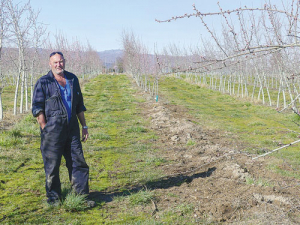NZ Catchment Groups Thrive with ‘Source to Sea’ Approach
The most successful catchment groups in NZ are those that have 'a source to sea' approach.
 Leaning Rock Orchard manager Peter Bennie shows where a small number of trees had to be destroyed because of the import accreditation issue.
Leaning Rock Orchard manager Peter Bennie shows where a small number of trees had to be destroyed because of the import accreditation issue.
Protecting New Zealand’s biosecurity status is paramount in the wrangle over imported American fruit stock, says Summerfruit NZ chair Tim Jones.
Imports from the cultivar supplier Washington University Clean Plant Center Northwest (CPCNW) have been halted and thousands of trees either impounded or already destroyed, after the Ministry for Primary Industries said it could not be sure of their disease status because of non-compliance issues at the US facility.
Growers have challenged MPI in the High Court, which has directed MPI to reconsider and work with growers to develop more appropriate ways of managing its concerns.
Jones, the general manager of the Central Otago cherry orchard company 45 South, says the affair raised several issues.
“From an industry point of view, the most important thing to protect is our biosecurity status, so we took the view that if there is any risk obviously the plants should be destroyed,” he told Rural News.
“The bulk of the growers who had five trees or ten trees said ‘I don’t care, let’s just get rid of them. If there’s a risk let’s get them off the property’.”
However, the court case was taken by growers, such as nurseries, with more money at stake.
“So the industry groups – Summerfruit, Pipfruit – have sat to one side while that court case has been going on, just to see exactly where that’s going to shake out,” Jones says.
“Growers are saying to us ‘biosecurity is paramount, so we need to go into bat for them’.”
He says Summerfruit NZ would be “more than happy” for the impounded trees to be released if there was proved to be no risk.
Many of the affected trees have already been destroyed. Leaning Rock Orchard, Alexandra, had trial numbers of new varieties amounting to about a couple of dozen trees in total.
Orchard manager Peter Bennie, indicating the gaps in the rows where trees were lifted and burned, emphasised that he was not criticising the way MPI handled the matter.
Jones says the bigger issue for the future is how to maintain a steady pathway of new genetic material coming into NZ.
“This is closing the border at the moment for new stuff to come in. We’ve got an outdated import health standard that needs to be rebuilt so we can use modern technology.”
CPCNW is now saying it’s not interested in seeking re-accreditation for the NZ market. “That’s a concern, not just for summerfruit, but for pipfruit and any plant material that might be coming from that facility into NZ.”
Jones told Rural News that the problem for NZ is that it’s so small a market that suppliers find it uneconomic to deal with our accreditation requirements.
“We fight that... with chemical companies, for example – fungicides, insecticides, that sort of thing. We’re such a small market that the cost of registration is prohibitive.”
Good news for kiwifruit growers - a record crop with forecast per hectare returns at record levels for all fruit categories for the 2025-26 season.
As guests gathered on what is known as the Speaker's Lawn - a beautifully manicured patch of grass behind the main buildings of Parliament - to mingle and enjoy a lamb chop to celebrate National Lamb Day, the mood was very much upbeat.
Global dairy prices are on a roll, recording a fourth consecutive jump on the Global Dairy Trade (GDT) auction this year.
Booming primary sector exports are helping lift earnings for farm service providers.
The world is waking up to the disadvantages of carpets derived from petrochemicals, creating opportunities for New Zealand strong wool.
The red meat sector finds itself in "a very rare set of circumstances", says Federated Farmers meat and wool industry chair Richard Dawkins.

OPINION: Here w go: the election date is set for November 7 and the politicians are out of the gate…
OPINION: ECan data was released a few days ago showing Canterbury farmers have made “giant strides on environmental performance”.